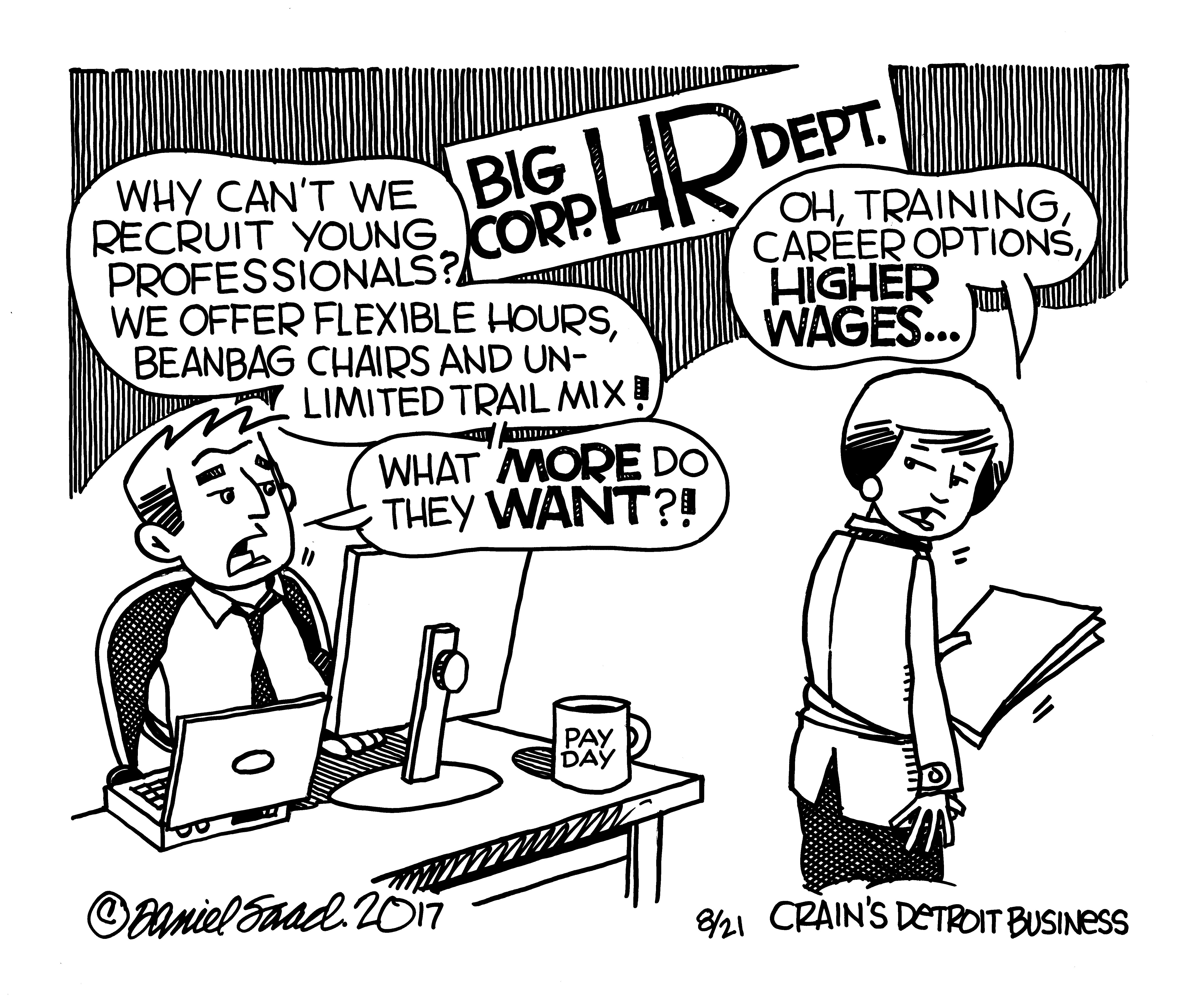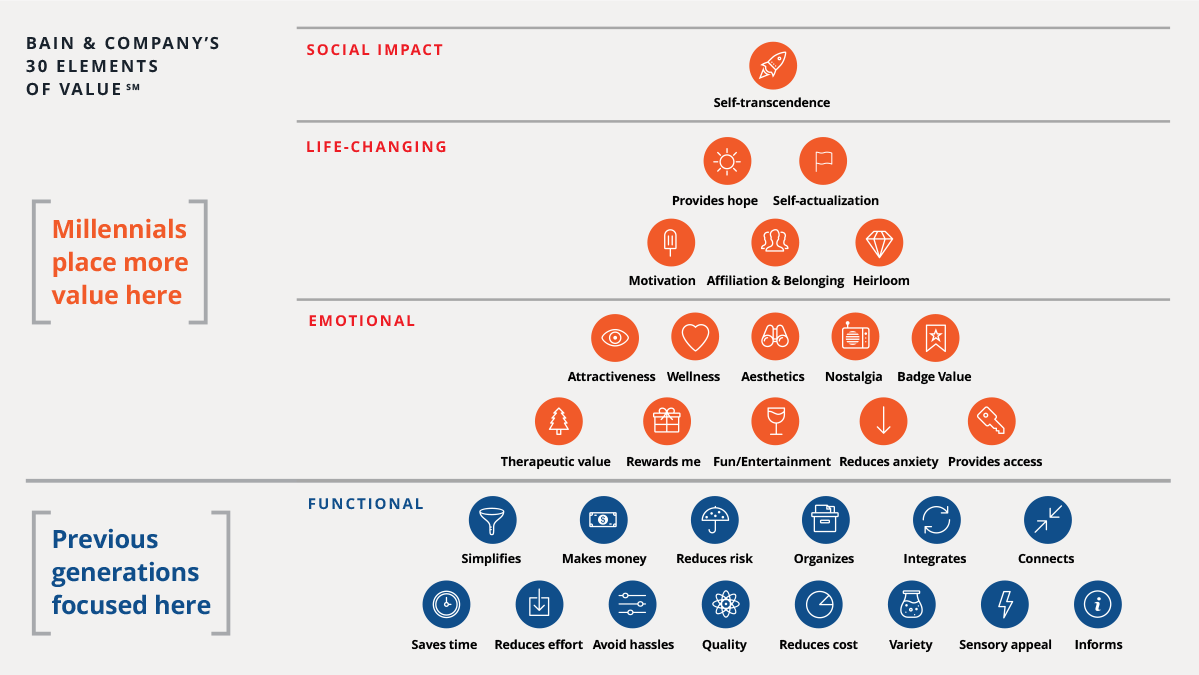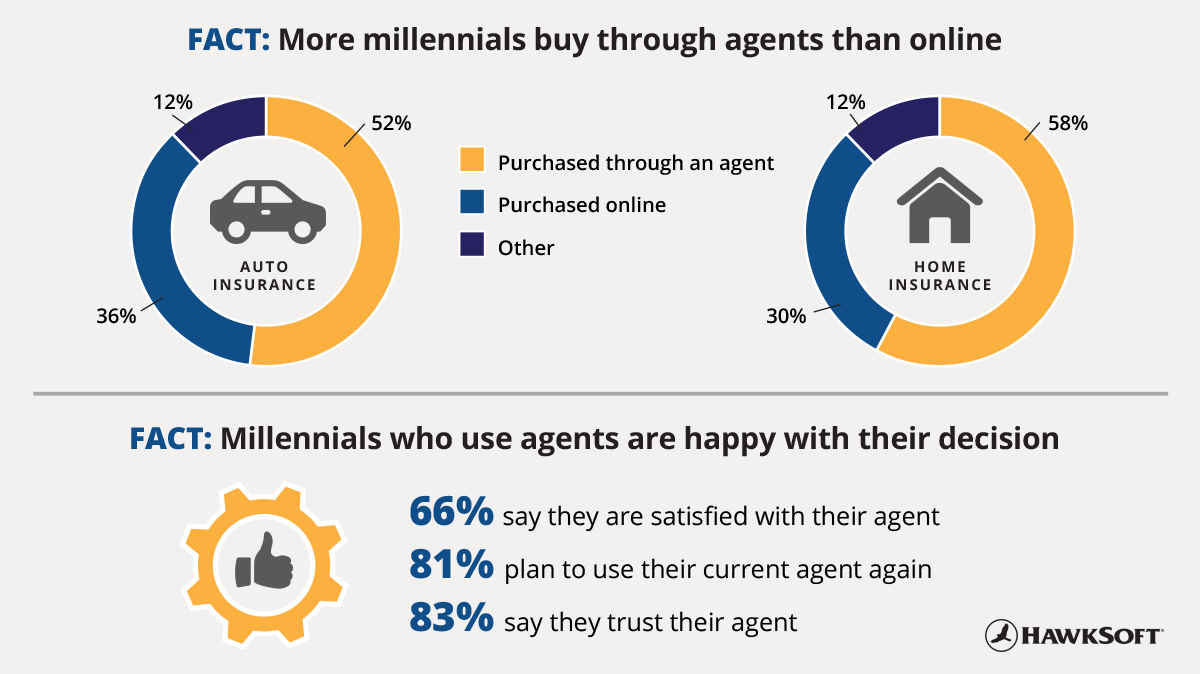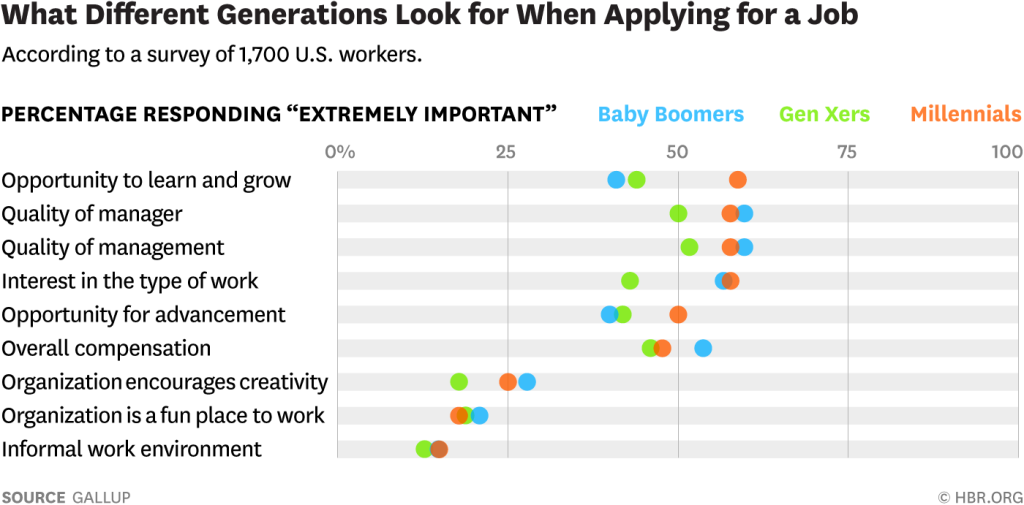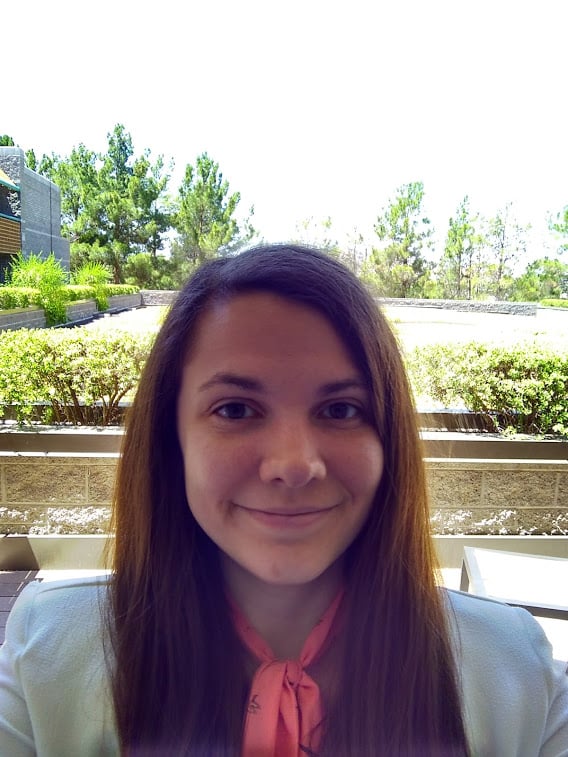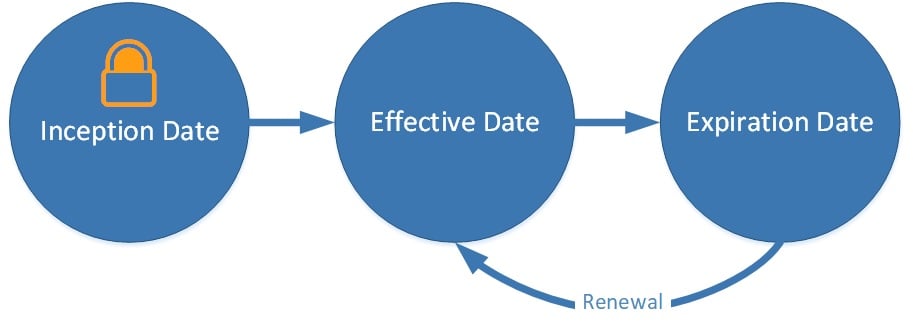Image used with permission
What does the word millennials bring to mind for you? Avocado toast? Social media? Ping-pong tables in the break room? A slide connecting the second and first floors at work? No one can accuse the millennial generation (those born between 1982 and 1995) of not having personality. And now that they comprise nearly one quarter of the US population and have a collective buying power of $200 billion (Agency Revolution), they’re the most important target market for today’s businesses and employers to understand. Brands are scrambling to understand how to market to them (Pop-up shops! Memes! Unicorn frappuccinos!), and employers are desperate to cater to them (Foosball tables! Breakfast bars! Massage chairs!).
The P&C insurance industry is no exception. With a product offering millennials can now purchase online and a talent gap that’s struggling to attract young people into the industry, it’s more vital than ever to understand what millennials are looking for in the products they buy and the jobs they consider.
The good news? Memes and massage chairs aren’t actually going to win them over, at least not long-term.
“Most millennials don't care about the bells and whistles found in many workplaces today―the pingpong tables, fancy latte machines and free food that companies offer to try to create job satisfaction. Giving out toys and entitlements is a leadership mistake, and worse, it's condescending. Purpose and development drive this generation.” - Gallup
Truly earning the loyalty of millennials means moving past surface gimmicks to understand what they value most. Once you do, you can provide them with those things, whether it’s packaged in a policy or a position at your agency. This will earn more permanent loyalty in an impactful way.
This article at a glance:
- Understanding millennial values
- Attracting millennial clients
- Position your agency as the specialty option
- Use the digital channels they value
- Offer services that fit their lifestyle
- Help them feel in control of their policy
- Recruiting millennial talent
Understanding millennial values
A recent study by Coverager and Cake & Arrow has an interesting approach to understanding millennial values using the lens of Bain & Company’s 30 elements of value for consumers, which are organized in a pyramid hierarchy similar to Maslow’s hierarchy of needs. The values at the bottom of the pyramid (the functional sector) are the most basic and easiest for companies and products to meet, but the ones higher up the pyramid (in the emotional, life-changing, and social impact sectors) provide the most value to consumers.
Image modified from Cake & Arrow
While the brands and consumers of previous generations focused mainly on the functional sector, millennials already expect a high level of functionality in the products they consume and activities they participate in. The things they value have moved higher up the pyramid, toward things that will help them progress emotionally, change their lives, and impact their social community.
There are three major areas of value for millennials that are important to understand and incorporate:
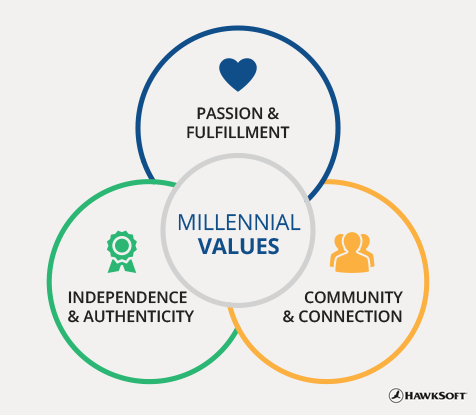
 Passion & fulfillment
Passion & fulfillment
Jim Clifton, CEO and Chairman of Gallup, describes one major shift in millennial values at the beginning of their study on how millennials want to work and live: “Millennials don't just work for a paycheck―they want a purpose. For millennials, work must have meaning....Back in the old days, baby boomers like me didn't necessarily need meaning in our jobs. We just wanted a paycheck...For millennials, compensation is important and must be fair, but it's no longer the driver.”
Millennials want their work to go towards something they personally believe in, and to clearly understand the reason for and impact of their position. In fact, a recent survey of Gen Z consumers (the generation that comes after millennials) found that “a job that aligns with personal interest” was the most important attribute for job consideration, even above “income potential.” This extends to the products younger generations purchase as well. Millennials want to do things―and buy things―that align with personal values and their sense of fulfillment.
 Community & connection
Community & connection
Growing up amidst the rise of social media and urbanization has had a significant impact on millennials. Cake & Arrow describes the fallout: “Despite being hyper-connected digitally...many of the Millennials we spoke with reported feeling lonely, isolated, and lacking more traditional support networks. They were looking for more authentic ways of connecting with their communities.”
Millennials want to feel a sense of belonging and be part of a tribe where they feel heard and can in turn hear and help others. They want to invest their time and money in things that are good not only for themselves, but for the larger community. Christopher Cook, owner and president of Alliance Insurance Services, said in an Agency Revolution roundtable, “I’ve come to the realization that my staff, which includes a lot of young folks, needs to understand what the culture is and what their path is and how they’re impacting not only their lives and their customers’ lives, but the community.”
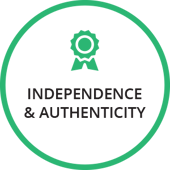 Independence & authenticity
Independence & authenticity
While previous generations needed to go to specialized people to get the products and services they were looking for, millennials were raised in the age of Google. They’re used to researching their problems, seeking out answers, and ordering products or services online and on their own. Having lived through the mass-marketing heyday of their parents, they’ve become mistrustful of the empty promises of traditional marketing campaigns and gravitate instead toward what they see as a more true source: reviews.
Because of this, millennials tend to respond better to a marketing approach that focuses on providing solutions and helping them solve problems, rather than simply selling a product. According to Agency Revolution, “Millennials trust that authentic content is empowering, and they prefer it over outbound, traditional marketing. This drives the content-rich marketing approach that prevails today, with millennials consuming over 25 hours of online information each week and trusting the reviews and recommendations of complete strangers with whom they have common likes and preferences.”
This in turn means millennials are more likely to trust products and companies they feel are authentic and transparent with their customers. Companies are now expected to list the ingredients of their products, conditions of their workers, and the charities to which they contribute. Millennials expect deep visibility into the inner workings of a company and its values. They want control over which brands their money is going to support.
Attracting millennial clients
With a better understanding of what millennials value, your agency can better determine how to speak to them as potential clients. Don’t make the common mistake of assuming millennials only care about price and convenience and won’t consider buying through an independent agency who may not be able to compete on those fronts. Remember, both those elements fall in the functional sector of Bain & Company’s elements of value, whereas millennial values are situated higher up the pyramid. If you can resonate with millennials in an emotional, life-changing, or socially impactful way, they will choose your agency even if it’s not the cheapest option.
In fact, a recent Liberty Mutual/Safeco study found that more millennials buy insurance through agents than online; that they trust and value their agents; and that they care more about getting comprehensive coverage, understanding their coverage, and a good service reputation than getting the lowest price or an easy purchase process.
Stats from Safeco/Liberty Mutual study
In short, the millennial client base is there. Now, how do you get their business? We’ve got a few tips.
- Position your agency as the specialty option
- Use the digital channels they value
- Offer services that fit their lifestyle
- Help them feel in control of their policy
Position your agency as the specialty option
As we’ve already established, millennials care about other factors of perceived value more than cost. They’ll spend extra money at the grocery store to buy organic produce. They’ll fork over a few more dollars to eat at a restaurant that serves locally sourced foods. They’ll wait two more weeks to get a bottle of shampoo that was formulated for their specific combination of hair needs. Why should their insurance solution be any different?
“We believe independent agents will win in this market because they have a competitive advantage that speaks really well to the millennial consumer segment—ease of doing business, choice in terms of breadth of offerings, and custom-tailored advice.” - Tyler Asher, Liberty Mutual Business Lines
Your agency might not be able to compete with the speed and price of your competitors, so instead focus on where you can win―what you provide that huge corporations (which millennials already distrust) can’t offer. Position your agency as the “locally made” option that offers a personal relationship, a deep understanding of local issues, services tailored just for them, and involvement in their local community. If you can help them understand the true value of what they’re paying for, millennials have shown they will happily pay it.
Use the digital channels they value
Millennials live in a digital world, but that doesn’t mean they want to forego a relationship with their agent. It just means that relationship might look a little different than it did in the past. In Agency Revolution’s roundtable, Matt Masiello of SIA and SAN Group explained, “The way we define a relationship as the traditional insurance person versus the way [millennials] define it is very different. They want the relationships, but it may not be a physical face-to-face meeting; it could be digital, text, could be done from afar.”
Consider using digital tools like client texting, chat systems, online appointment scheduling, and social media. Make it as easy as possible for millennials to communicate with you in the way that’s best for them, which may not be an in-person visit or a phone call. If your agency isn’t available on the channels where millennials roam, your Open for Business sign is missing.
Offer services that fit their lifestyle
Are you offering policies and coverages that work for millennials? For example, they may not have children yet or own their own home, but they may have valuable technology, devices, and equipment that needs to be insured.
On his blog, Chris Paradiso stresses the importance of not overlooking the millennial demographic: “Millennials represent real buying power, regardless of their lifestyle. Yet too many marketers wait for young shoppers to transition to traditional family households before they engage them...Not surprisingly, young families with children are the most engaged. But single, childless Millennials often feel disenfranchised...Your agency brand must make the effort to meet them where they are in life.”
Help them feel in control of their policy
Because millennials place so much value on independent problem solving and transparency, one of the best things you can do is help them understand their coverage and empower them to make informed decisions about their policies. Only 34% of the respondents in the Liberty Mutual/Safeco study described themselves as insurance savvy compared to 52% of baby boomers, so independent agents can play a vital role as a trusted advisor in the insurance space.
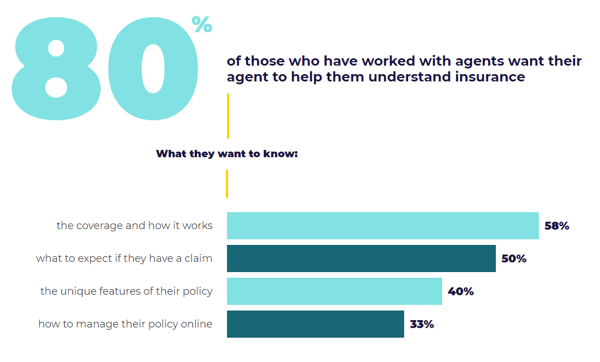 Source: Safeco/Liberty Mutual
Source: Safeco/Liberty Mutual
Millennials like to understand where their money is going and how it’s being used, so try to be as transparent as possible when explaining their costs and the reasons behind them. Help them understand that their premiums aren’t just money that disappears from their accounts with no benefit to them unless disaster strikes, but that it allows others to receive claims payouts when they need them. To paint the picture, you might want to share examples of people in your community who have been helped by your agency in their time of need. Millennials will be more willing to part with their money if they understand it’s going to a worthy cause, even when they are not currently benefiting from it. It fosters a tribe mentality and sense of belonging and contributing to a community.
Recruiting millennial talent
 What better way to connect with millennial clients than to recruit millennial employees? The insurance industry is currently facing a monumental talent gap. With nearly half of insurance industry professionals being older than 45, 25% of the workforce is expected to retire in the next few years. This will open an estimated 400,000 positions by 2020 (Insurance Journal). While the need is dire, young talent is not naturally flocking to the industry. A study by the Pew Research Center found that only 4% of millennials are interested in working in the insurance industry.
What better way to connect with millennial clients than to recruit millennial employees? The insurance industry is currently facing a monumental talent gap. With nearly half of insurance industry professionals being older than 45, 25% of the workforce is expected to retire in the next few years. This will open an estimated 400,000 positions by 2020 (Insurance Journal). While the need is dire, young talent is not naturally flocking to the industry. A study by the Pew Research Center found that only 4% of millennials are interested in working in the insurance industry.
So what can you do to attract much-needed millennial talent to your agency? Here are our top suggestions:
- Recruit and raise awareness early
- Promote career benefits in terms of millennial values
- Help them envision their career path
- Provide mentoring and development opportunities
Recruit and raise awareness early
Because millennials are largely either unaware of or uninterested in careers in insurance, one of the best things you can do is raise awareness and recruit early in the career path. In an Insurance Business article David Chipp of Brown and Riding says, “it starts from the bottom with recruiting young people interested in insurance as they go into school, or also recruiting on campuses as people are graduating, and letting them know what opportunities are there in the insurance industry right out of college with just a bachelor’s degree.” He himself started in the industry as a student with no experience who simply wanted to pay his way through school, and suggests that catching college students early in their schooling can open their eyes to the career opportunities in insurance.
Your agency can consider hiring students and interns who are still early in their career, and who may even consider changing their academic path to help them turn their student or entry level job into a long-term career.
It’s also important to focus on raising awareness even earlier in the pipeline, such as high school, so students can enter college already planning to pursue an education that will help them start a career in insurance. We spoke with HawkSoft customer Lori Augustyniak of Horizon Insurance, who focused on this through involvement with Big I’s InVEST program. She helped teach high school students about insurance as part of an Entrepreneurship or On the Job Training class. Students created their own mock agency, came up with a business plan and marketing program, and went through the steps of quoting auto insurance for practice customers. At the end of the course, students could compete for scholarships through the local, state, and national level of Big I.
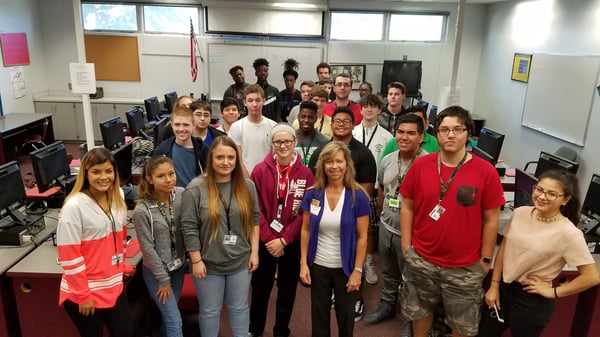
Lori with her Project InVEST class at Palmetto High School, FL
Several of the students Lori worked with through InVEST later became interns at her agency. “Involving high school students helps get them excited about insurance,” Lori told us. “There are a lot of misconceptions that it’s boring or that there’s not many opportunities for them. They don’t realize all the different things an agency does.”
Promote career benefits in terms of millennial values
Robert Pettinicchi of Insurbanc hits the nail on the head in an Insurance Business article when he says, “It’s a great field, but I really don’t believe that the industry does enough to promote just how good a field it is.” Millennials aren’t aware of insurance careers, or they have misconceptions about the industry that keep them away. According to a study by The Institutes, millennials perceive insurance as too focused on sales, boring, or something they don’t think their education or interests qualify them for.
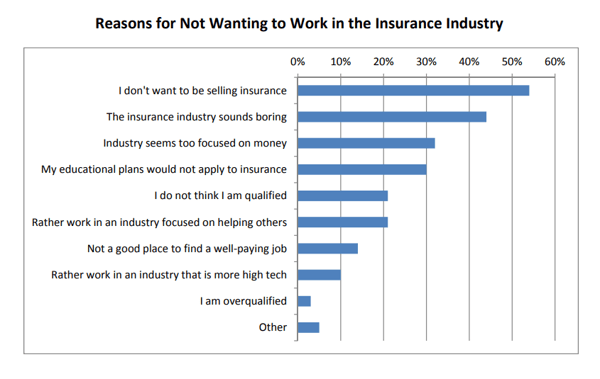 Source: The Institutes
Source: The Institutes
In reality, however, the career of an independent agent provides many of the things millennials are looking for in a job, such as a rewarding career, an impact on the community, and a flexible schedule. It’s your agency’s job to connect the dots to help young people understand how your independent agency fits the 3 main values millennials care about, as outlined earlier.
Passion & Fulfillment
There’s a perception that insurance is boring, but many fields that aren’t considered traditionally exciting are still pulling millennials in. Tony Cañas of The Jacobson Group, known as “the Insurance Nerd,” points out that this is true of the accounting industry: “Thousands of kids show up at every college campus every fall, specifically looking for an accounting degree. Personally, I think we have a much more interesting and much more rewarding career. We’re really doing something for the world, which is very attractive to this generation.” Insurance has a real, direct impact on the lives of the people it protects, unlike many other professions.
Some might not consider working at an insurance agency because they’re not interested in sales, but they might not know that an agency needs other roles, such as ones in marketing, customer service, administration, and other areas that might better suit their interests. Help them see that an agency needs all types of roles and personalities, and that no matter where their interest lies, there’s a place for them.
HawkSoft customer and recipient of the 2019 Agent for the Future Award Chris Paradiso of Paradiso Insurance shared with us that he accomplishes this by inviting students at a local college to spend a day at his agency. “A lot of times they don't understand what insurance really is until they come into an agency. It's amazing, once you get them inside the agency they see it's much more interesting than they expected. They can see all the different aspects, from commercial to personal lines to marketing to service. It's been very eye opening for them and for me. The more we can get students inside the agency, the more they will see the opportunity in the industry.”
Community & Connection
Millennials strongly value relationships, a sense of community, and helping others, and this is where a career at an independent agency truly shines. Help younger talent understand that at its core, insurance is about protecting people from hardship and putting lives back together when disaster strikes. You might want to have a few examples to share of people in your community who your agency has helped through disaster. This will help them understand the real impact for good an agency has on the community.
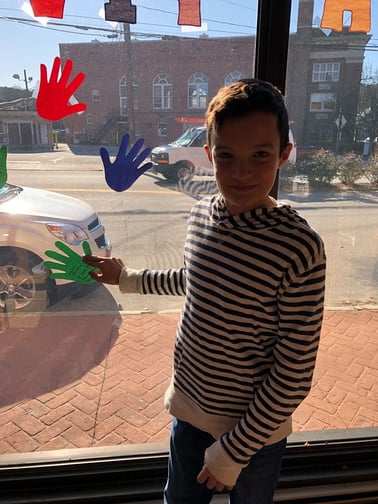
You could also share things your agency does to sponsor, volunteer, or otherwise be involved in the community. Chris Paradiso stressed to us the importance of getting involved with causes that speak to your agency’s values. “Saying you’re a great leader and being a great leader are two drastically different things. Your agency should be involved in things you’re actually passionate about. Millennials really appreciate seeing that passion, and if you get behind a cause you don’t really believe in, they can see that. It doesn’t come off as authentic.”
Chris has found that his agency's involvement in the community (such as the High Five a Veteran project, pictured) draws in potential employees. “Because our agency does what we do socially, it's a lot easier to find people who want to work for me. The trust is already built.” He gives an example of a young agency headed by a millennial who recently reached out to him. “He knew he wanted to run his agency under mine, even before he met me in person,” Chris says. “I asked why. He said ‘I've been watching what you do socially for 3 years. I know about your sister, I know you love the Special Olympics, I know you raise money for veterans, I know you stand for the flag. I know who you are, and I already feel like I'm part of your family.’”
If your agency isn’t currently focusing on community involvement, Chris suggests creating a brand guide that defines what your agency stands for, and then identifying causes that reinforce that vision.
Independence & Authenticity
This one should be easy―independent is right in the name. An independent agency is a great option for millennials who might want to eventually run their own business. As a business owner they’ll have complete control over the business decisions, values, and relationships of their agency. It can also lend to flexible hours, which millennials are more focused on than past generations. Younger talent may not have the experience to jump right into starting their own agency, but a position at an existing agency can be a great way for them to gain industry experience and benefit from the wisdom of seasoned professionals before they do so.
Help them envision their career path
Millennials are notorious for job-hopping every few years if they don’t feel their current job provides enough opportunities for career growth. Gallup found that more millennials ranked “opportunity to learn and grow” as extremely important than any other factor―much more so than older generations. You can help ease these concerns (and reduce the risk of losing them before they’ve had a chance to become an asset to your agency) by outlining the entire career path for new talent.
Tony Cañas provides these suggestions: “Hiring managers and others involved in the interview process can illustrate potential internal career paths and share stories of their own career progression to help millennials understand how a particular position can lead to a successful long-term career... Explain how the entry-level position provides the experience for the individuals to be promoted as many of our long-time employees retire over the next five years.”
Show new hires an org chart for your agency and help them understand where they’re starting and where they can be in one, three, five, and ten years. This will help them feel in control of their own career (contributing to their sense of independence), as well as speak to the value of authenticity by being transparent about the career path.
Provide mentoring & development opportunities
 Because growth and development is so important for the millennial generation, they expect professional development opportunities to be offered at the role they choose. Your agency might not have the resources to provide anything elaborate, but even offering employees the chance to attend a conference, take a class, or receive cross training will help them feel that the agency is invested in them and their career.
Because growth and development is so important for the millennial generation, they expect professional development opportunities to be offered at the role they choose. Your agency might not have the resources to provide anything elaborate, but even offering employees the chance to attend a conference, take a class, or receive cross training will help them feel that the agency is invested in them and their career.
Another way to foster professional development is through mentoring, which is a great fit for the millennial focus on one-to-one relationships, open communication, and a strong feedback loop. Whereas previous generations expected their superiors to fill a more structured, authoritative role, millennials are looking for someone who will listen to them and be a partner in their development.
“Millennials don't want bosses―they want coaches. The role of an old-style boss is command and control. Millennials care about having managers who can coach them, who value them as both people and employees, and who help them understand and build their strengths.” - Gallup
Try pairing younger talent with a seasoned professional who can show them the ropes and pass on invaluable knowledge that will soon be gone from the industry. The mentor will benefit from this relationship as well, and can learn from their younger counterpart about incorporating new technologies and speaking to the values and needs of a younger demographic.
An untapped resource
It might seem intimidating to adjust your approach in both sales and hiring to connect with the millennial generation, but the potential benefits are huge. Bill McDermott, CEO of SAP, is enthusiastic about the possibilities of the rising generation: “The opportunity here is stunning. If we equip millennials with the best technology and empower them with permission to be bold, I think we’ll watch the next great generation do incredible things” (Brown & Joseph). Armed with a better understanding of millennial values, you can do more than throw substanceless gimmicks at them to draw their attention―you’ll offer true value to them whether they’re a potential client or employee.

